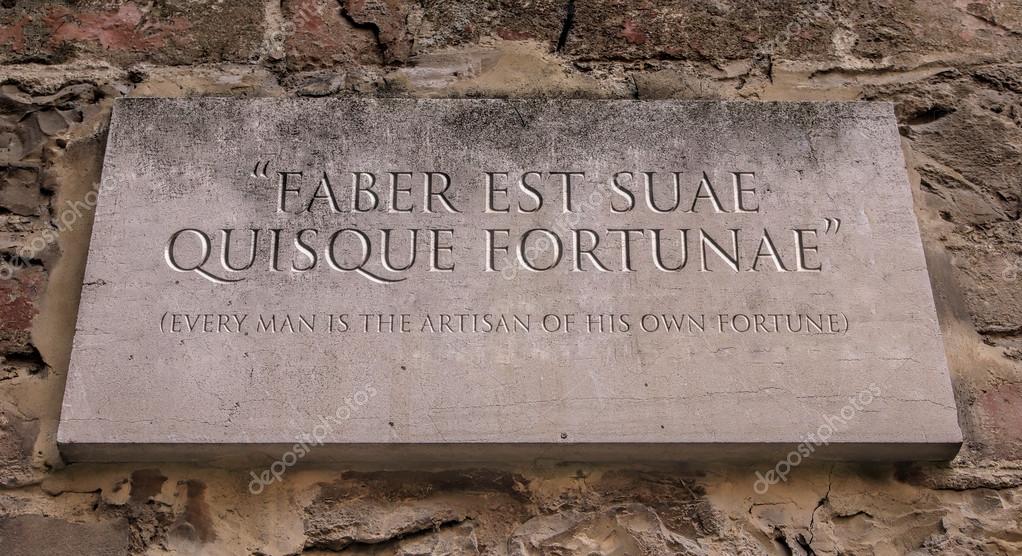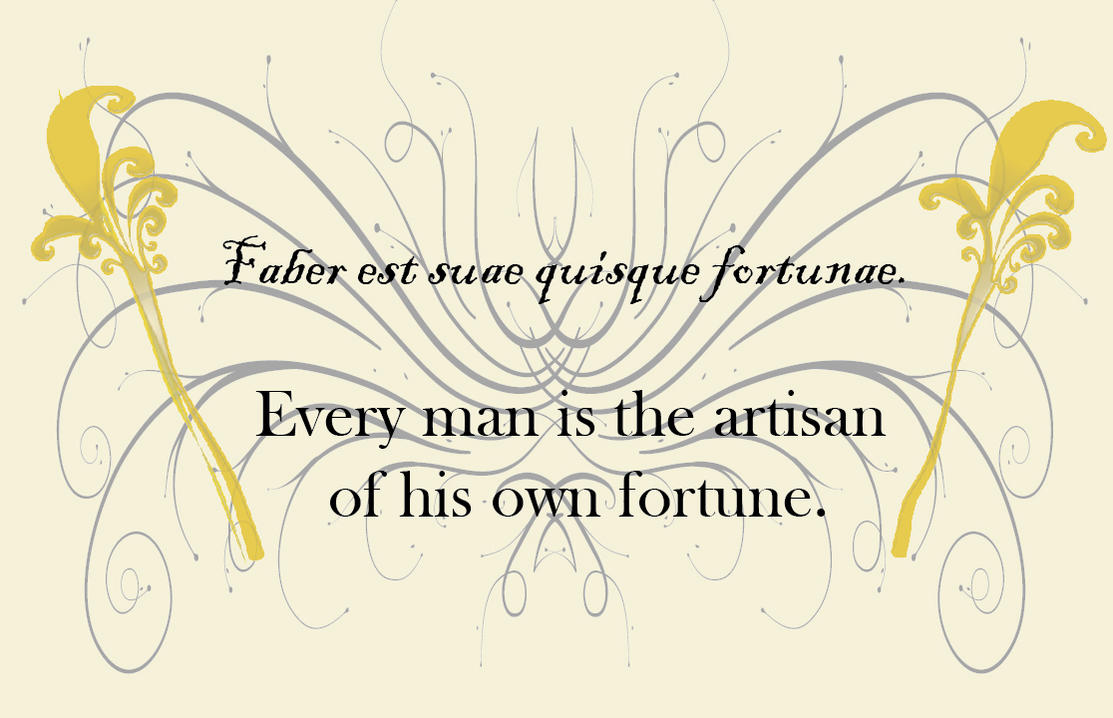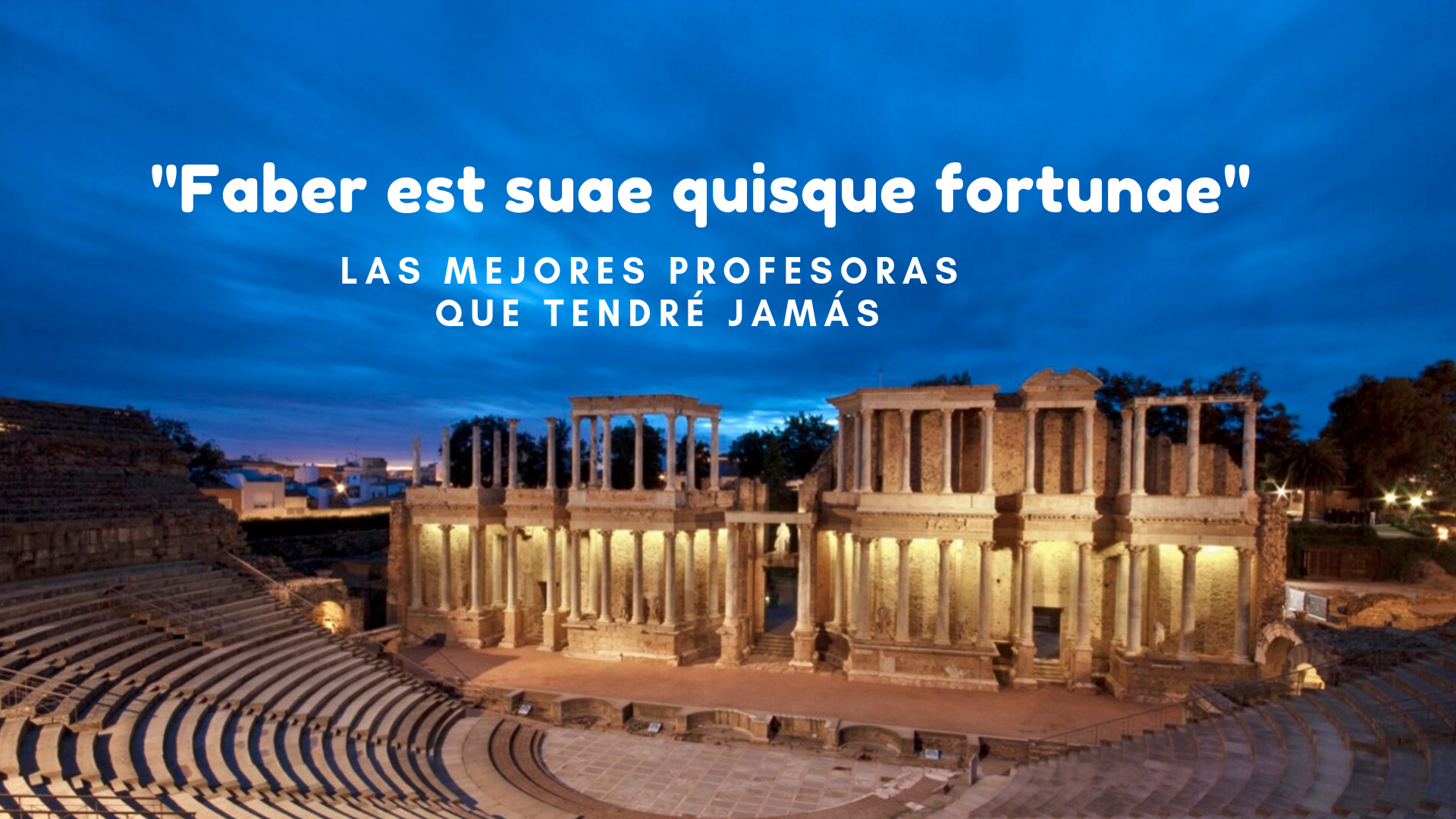
Фразы для тату на латыни с переводомлитера к — TATTOOPHRASE.RU
faber Faber est suae quisque fortunae Faber quisque fortunae suae Fabius fabre fabrefacio fabrefio fabrica Fabricati diem fabricatio. Related entries. A fortiori A mari usque ad mare A pedibus usque ad caput Ab incunabulis Ab intestato Ab ovo usque ad mala abaestuo abdomen, venter, uterus abequito abortio.

Faber est quisque fortunae suae EntertainmentMesh
" Faber est quisque fortunae suae ", (English, " Every man is the architect of his own fortune ") [1] This quote from Appius' famous speech (279 BC) opposing peace with the Greek general Pyrrhus I is sourced from the earliest known Roman historian with surviving works, Sallust, within a letter of political counsel written to Caesar circa 39-35 BC.

Faber est suae quisque fortunae. Una frase latina que significa Cada
It is a quote from Latin and it means each man is the maker of his fortune. Add a meaning Add Faber est suae quisque fortunae details Phonetic spelling of Faber est suae quisque fortunae Add phonetic spelling Synonyms for Faber est suae quisque fortunae Add synonyms Antonyms for Faber est suae quisque fortunae Add antonyms

Runder SilberAnhänger mit Diamant und gestempelten lateinischen Spruch
The word order is unusual, so it's striking in Latin, which is appropriate for those short sayings. It'd be like saying in English, "Of his own fortune, each man is the architect." It does makes grammatical sense because both faber and quisque are in the nominative case, which fits with the predicative use of est.

FABER EST SUAE QUISQUE FORTUNAE Poster DARKO Keep CalmoMatic
Faber fortunae suae. Lat.—"The architect, founder, of his own fortune." N.B. The original expression, which occurs in Sallust [the distinguished Roman historian], is, "Suae quisque fortunae faber," "Every one is [more or less] the maker of his own fortune.---Ancient and Modern Familiar Quotations from the Greek, Latin, and Modern Language. 1892.

Citas Latinas faber est suae quisque fortunae Cada uno es artífice
Faber est suae quisque fortunae è una locuzione latina che significa «ciascuno è artefice della propria sorte»; [1] in luogo di quisque si trova talvolta unusquisque .

Faber est suae quisque fortunae Pedro Alves da Veiga
"Faber est suae quisque fortunae." "YOU ARE THE ARCHITECT OF YOUR OWN DESTINY." APPIUS CLAUDIUS CAECUS. WELCOME TO FORTUNA MIGRATION. Fortuna Migration is a multilingual and international firm that provides legal advice to clients wishing to start a new life. At Fortuna Migration we help you navigate the complexities of migration laws and.

"Faber est suae quisque fortunae" Sticker von adiosmillet Redbubble
faber est suae quisque fortunae. sùe ku̯ìskue fortùne (lat. «ciascuno è artefice della propria sorte»). - Antica massima, che Sallustio attribuisce ad Appio Claudio Cieco, e che si suole citare per affermare che nella vita dell'uomo conta più la volontà e l'azione che l'intervento della sorte.

FABER EST SUAE QUISQUE FORTUNAE ANTIQUE ANDREA925
faber est suae quisque fortunae Phrase Meaning: every man is the artisan of his own fortune. Comment. Appius Claudius Caecus; motto of Fort Street High School in Petersham, Sydney, Australia . Word-for-word analysis: A much more detailed analysis with detection of relationships or clauses can be found in our Sentence Analysis!

Faber Est Suae Quisque Fortunae Fate TShirt TeePublic
Appius Claudius Caecus ( fl. c. 312-279 BC) was a statesman and writer from the Roman Republic. He is best known for two major building projects: the Appian Way (Latin: Via Appia), the first major Roman road, and the first aqueduct in Rome, the Aqua Appia . He is the first Roman public figure whose life can be traced with some historical certainty.

Faber est suae quisque fortunae Digital Art by Vidddie Publyshd Pixels
Of Fortune. I T cannot be denied, but outward accidents conduce much to fortune; favor, opportunity, death of others, occasion fitting virtue. But chiefly, the mould of a man's fortune is in his own hands. Faber quisque fortunæ suæ [Every one is the architect of his own fortune], saith the poet. And the most frequent of external causes is.

301 Moved Permanently
Translation of "faber est suae quisque fortunae" into English . every man is the artisan of his own fortune is the translation of "faber est suae quisque fortunae" into English. Sample translated sentence: Cum enim sit animal sociale, homo suae faber fortunae est intra plures peculiares coetus, qui ut perficiantur ulteriusque provehantur, ampliorem necessario societatem, quae universalis.

Faber est suae quisque fortunae El Periódico de Villena
Faber est suae quisque fortunae (Idiom, Latin) — 11 translations (Croatian, English, French, German, Russian, Serbian, Swedish, Turkish.) Deutsch English Español Français Hungarian Italiano Nederlands Polski Português (Brasil) Română Svenska Türkçe Ελληνικά Български Русский Српски Українська.

Faber est quisque fortunae suae Drinking Glass by KWGdesigns CafePress
La frase è attribuita all'autore romano Appio Claudio Cieco (350-271 a.C.), che la usò nelle sue Sententiae, [1] massime a carattere moraleggiante e filosofeggiante, riferendosi alla capacità dell' essere umano di guidare il proprio destino e gli eventi che lo circondano. Uso moderno Prometeo plasma l'uomo, olio su tela di Piero di Cosimo (1515)

Latin Quote "Faber est quisque fortunae suae" Appius Claudius Caecus
Faber quisque fortunæ suæ [Every one is the architect of his own fortune], saith the poet. And the most frequent of external causes is, that the folly of one man is the fortune of another. For no man prospers so suddenly as by others' errors. Serpens nisi serpentem comederit non fit draco [A serpent must have eaten another serpent before he.

Faber est quisque fortunae suae. Every man is architect of his own
faber est suae quisque fortunae. every man is the artisan of his own fortune. Appius Claudius Caecus; motto of Fort Street High School in Petersham, Sydney, Australia. fac et spera. do and hope. motto of Clan Matheson.